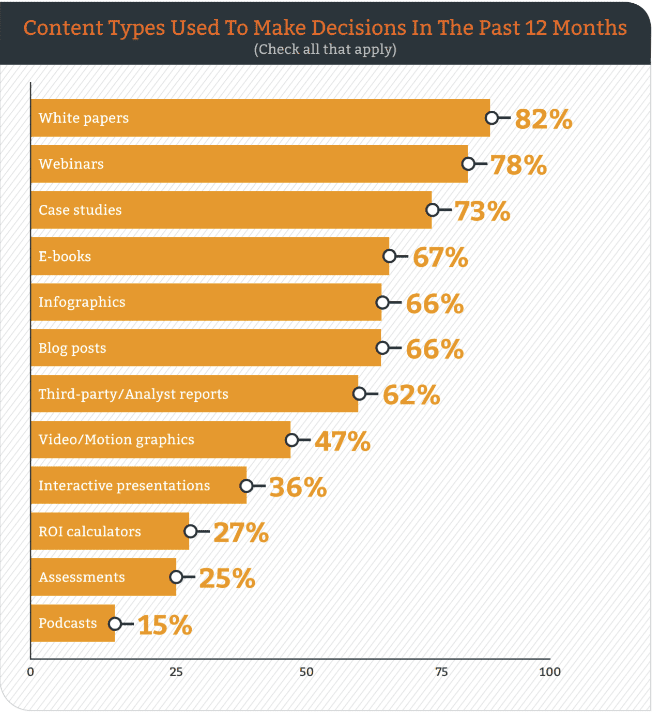
How to pick a B2B marketing agency? 6 things you’re not likely to hear in an agency pitch
 If you’re in the market for a marketing firm, you’ve probably read a dozen articles about how to select an agency. After a while, they all sound the same: “we’re experts in digital marketing, we know b-to-b, we specialize in your industry.”
If you’re in the market for a marketing firm, you’ve probably read a dozen articles about how to select an agency. After a while, they all sound the same: “we’re experts in digital marketing, we know b-to-b, we specialize in your industry.”
Sounds like a broken record (if we still listened to records). I went for a run the other day, and it just started popping in my head: here are criteria you’ll never hear when hiring a marketing firm. It ties to the old marketing story about uncovering what people really want, by considering what people want when they’re shopping for a drill: people want to buy a hole, not the drill. Same thing for marketing firms: as a potential client, it’s nice to see the shelf full of awards or hear the presentations about the “creative process.” But, you really want to know how these guys are going to make you a star, and help you hit your revenue numbers.
So, here’s what to listen for:
- “We don’t care about generating any leads for you.” Well that sounds strange, but when you think about it, generating leads is no longer hard to do, or has any real value for you anyway. Today, we all know how to generate leads. We know what the cost/lead should be. We know what tends to generate the most leads. But you don’t want leads, you want opportunities and quote requests. That’s all that matters for your sales team: they say, “just point us in the direction of a warm lead, and we’ll do the rest.” So ask your potential agency to show you numbers about opportunity generation, not lead generation, and you’ll get closer to finding the right agency partner.
- “Your competitive advantage is MarTech.” Most of our clients love their products and their technology. Since we work mostly with manufacturers selling to engineers, communicating technical value and advantages is certainly important to them – and to us. Actually, the real impact for a marketing program goes beyond just pushing data sheets out to the world. It’s tied to Marketing Technology, or MarTech as it’s becoming known. Think of it this way: today, everybody’s got a website. Everybody’s got a “Get a Quote” button on their site. Everybody’s got a few landing pages. So we’re all at the same starting point.However, those companies that use MarTech with more sophistication, with more of a focus on CONVERSION to opportunities, are going to win more customers, and spend less money doing so. If you look at your sales funnel, the question you should be asking is not just how many new leads go into the top every month, or even what the size of your pipeline is. Rather, it’s how quickly do you move leads through the funnel to close, and what is your cost/opportunity for doing so? Establish that baseline, and then apply MarTech tools to push those leads through the funnel faster, and at less cost.
Consider the MarTech landscape graphic to the right. It displays more than 3500 company logos that sell a product designed to optimize your lead gen and opportunity generation programs. More than 3500? How do you keep up with that, especially considering that there were just 150 logos on the chart as recently as 2011? What an explosion! No wonder marketing feels so overwhelming today.
Our agency actually functions as a TechLab for our clients, in which we identify new tools to use, test them for effectiveness, and then roll them out to other clients if they pass muster. We’ve found conversion tools, call tracking technology, search engine technology and a host of other “technology accelerators” that convert traffic to quote requests, and do so in less time for less money.
Does your potential agency partner show “Tech Love”as one of their practices? If not, how in the world can they – and you – ever keep up with competitors who are more aggressive in applying new MarTech tools?
- “Yes, we wrote that handbook on semiconductor device physics ourselves.” You’re not likely to hear agencies tout their actual success in technical writing, even though having to re-write agency copy is a great frustration for clients. One of the most common struggles any technical or manufacturing company has is generating accurate content. But after 30+ years building engineer-to-engineer campaigns, we’ve developed a series of interview techniques and tools that really work, as a process for producing copy our clients don’t have to “first-draft” or spend time doing heavy revisions. Now, I know what you’re thinking: “our products are too complicated for an outside writer to understand.” But we’ve written white papers, handbooks, videos and more on everything from LEDs to infrared cameras to, yes, that 150-page handbook on semiconductor test. We’re starting from scratch, from a blank piece of paper, rather than doing a superficial English grammar check on something you’re forced to provide as a first draft. Ask the agency not just to show you samples, but to give you references from editors at the trade journals they’ve worked with. Editors know the agencies they can depend upon for good copy – and those agencies that struggle to produce it.
- “Here’s EXACTLY how much you’re supposed to spend on marketing.” Why is the answer to this question such a mystery anymore? There are a host of studies that document how much the typical b-to-b company spends on marketing as a percentage of sales, and how they allocate those dollars. Even further, there are a variety of studies that document what types of content is proven to work best. Proven. To. Work. Best. If your agency isn’t talking about your budget with certainty, down to how much you should allocate for video, shows, advertising and search, then you’re talking perhaps to an agency not familiar with best practices in b-to-b analytics.
- “We work for free.” That’s a shocker, but today it’s true. The revenue your b-to-b agency should be generating for you in sales, on Amazon and your online stores should pay their fees many times over. You can even consider the Marketing Department as close to a profit center, just as the Sales Department is, since Marketing it responsible for web revenue, opportunity creation to drive the sales team, and analytical tools that document whether you have a 5:1 return on sales, 10:1, or higher. Ask your agency to show you their ROI metrics, and if they answer in terms of web traffic, clicks or other superficial metrics, ask again, or ask around for another agency referral.
- “Please don’t give us a retainer or a 12-month contract.” In truth, those are older forms of agency-client structures that have outlived their usefulness. Our agency has always operated without them, based on the belief that if a client is unhappy, they should be able to leave whenever they like, rather than both parties struggling through to some 12-month arbitrary finish line. It’s worked well for us, as our average client relationship of 7 years is far longer than they industry average of three years.And we’ve never liked the retainer model, for the simple reason that both agency and client outgrow it in a flash. Very quickly, one or both of these outcomes occur: the agency feels they’re putting in more work than they’re being paid for, and the client feels they’re paying for work not being done. This is all due to a lack of transparency tied to the retainer model, so we’ve always favored the more visible budget system that ties dollars to specific campaigns and deliverables. Clients see what we’re charging, and they see what they should get for that.
Last tip for that agency meeting: ask them what they’re “Best in the World” at providing to you. Is it something general, like “digital marketing?” “Strategic counsel?” Are they able to articulate it as something they’re truly better at than any other agency? We use the Best in the World exercise in our messaging workshops with clients, and it’s meant to be both an intimidating statement as well as a high bar for companies to uncover. If you’re not Best in the World at something, you’ll always struggle with “me-too” messaging and forced into a price war with your competitor.
The same is true for agencies. If they’re not Best in the World at providing something truly important to moving your company forward, their value as a partner will be short-lived.
At the end of the meeting, listen for hints about the 6 Questions above. You’ll find which agency understands that it’s all about impact, not activity. That’s why we built the “Measurably Better Marketing” methodology for our clients. We sought to take the vagueness out of marketing and treat it as a disciplined business practice, just as you treat your Accounting, Manufacturing, Purchasing or any other department in your company.
With the right methodology, you can finally make marketing work better, to “Predict it. Control it. And improve it.”


